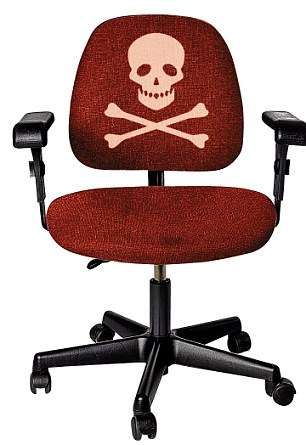Sitting in front of a desk for hours every day may feel like the norm for many office workers, but is this sedentary lifestyle contributing to an expanding waistline?
Research suggests that long hours spent in a chair could be doing more harm to your health than you think. From weight gain to serious long-term consequences, the impact of sitting all day can be significant.
Let leanandfit.info dive into the science behind how your office chair might be adding unwanted pounds and what you can do to combat this growing issue.
Is Your Office Chair Making You Obese – Article Index:
- The Connection Between Sitting and Weight Gain
- Does Sitting Make You Gain Weight?
- Can You Gain Weight from Sitting All Day?
- How Sitting Affects Your Metabolism
- Do You Gain Weight by Sitting All Day?
- How Sedentary Habits Lead to Obesity
- FAQs on Office Chair and Obesity
- Combating the Obesity Chair Effect
- Conclusion: Does Sitting on a Chair Make You Obese?
The Connection Between Sitting and Weight Gain
The global shift toward sedentary lifestyles, particularly in office environments, has become a significant public health concern.
Prolonged sitting, often referred to as “sitting weight gain,” is linked to a range of metabolic issues, including obesity.
Extended periods of inactivity slow down metabolism and reduce calorie expenditure, making weight gain more likely.
A study published in Obesity Reviews in 2017 found that prolonged sitting is directly correlated with an increased risk of obesity and metabolic diseases such as insulin resistance and type 2 diabetes.
When sitting for long hours, muscle activity decreases, leading to lower energy expenditure, according to research from the Journal of Applied Physiology.
This reduced calorie burn over time can contribute to excess fat storage, particularly in the abdominal region.
The American Journal of Clinical Nutrition states that extended sitting also affects appetite regulation, leading to increased hunger and a tendency to overconsume calories.
Additionally, research from the Journal of the American Heart Association has linked excessive sitting to an increased risk of cardiovascular diseases, even in individuals who engage in regular exercise outside of work hours.
Office workers are particularly vulnerable due to their predominantly seated work routines.
Studies from the National Institute for Occupational Safety and Health suggest that breaking up long sitting periods with standing or light physical activity can help counteract these effects.
Understanding these risks highlights the importance of integrating movement into daily routines.
Incorporating standing breaks, walking meetings, and active workspaces can play a crucial role in reducing the impact of prolonged sitting on weight gain and overall health.
Does Sitting Make You Gain Weight?
One of the most common questions people ask is: “Does sitting make you gain weight?” Let’s explore this topic with some key points:
-
Reduced Caloric Expenditure: When you sit, your body burns fewer calories compared to standing or moving. This decrease in energy expenditure can contribute to weight gain over time. According to the Mayo Clinic, prolonged sitting can lead to metabolic changes that make it easier to gain weight.
-
Metabolic Impacts: Extended periods of sitting can slow down your metabolism, affecting the body’s ability to regulate blood sugar and blood pressure, and to break down body fat. Research from the Mayo Clinic explains that this metabolic slowdown can result in increased fat storage, especially around the abdominal area.
-
Health Risks Beyond Weight Gain: Prolonged sitting has been linked to various health issues, including obesity, type 2 diabetes, and cardiovascular diseases. A study published in the Journal of the American Heart Association highlights that individuals who sit for long hours daily have a higher risk of heart-related issues compared to those who are more active.
-
Physical Activity Counteracts Sitting: Incorporating regular physical activity can help mitigate the negative effects of prolonged sitting. Even standing instead of sitting can increase calorie burn slightly. The World Health Organization (WHO) recommends at least 150 minutes of moderate-intensity resistance training per week to counteract sedentary behavior.
-
Sedentary Behavior and Obesity: While sitting itself doesn’t directly cause weight gain, it often accompanies other behaviors, such as snacking or reduced physical activity, which can lead to an increase in body weight. A study published in the American Journal of Public Health found that sitting for more than six hours a day is associated with a slower metabolism and increased fat accumulation.
In summary, while sitting for extended periods can contribute to weight gain and other health issues, incorporating regular movement and reducing sedentary time can help counteract these effects.
Can You Gain Weight from Sitting All Day?
It may seem harmless, but can you gain weight from sitting all day?
Absolutely.
Sitting down for long hours reduces the number of calories you burn. Even worse, being sedentary can lead to overeating.
A study conducted by the International Journal of Obesity found that those who sit for long periods tend to consume more calories than they burn, leading to gradual weight gain.
This is largely due to the fact that sitting affects hunger hormones like leptin and ghrelin, increasing your appetite and cravings for unhealthy snacks.
How Sitting Affects Your Metabolism
Prolonged sitting can significantly impact metabolism, leading to weight gain. Here’s how:
-
Reduced Caloric Burn: Sitting burns fewer calories than standing or moving. Research published in the European Journal of Preventive Cardiology suggests that replacing six hours of sitting with standing can help prevent weight gain over time.
-
Metabolic Slowdown: Extended sitting periods slow down metabolism, affecting the body’s ability to regulate blood sugar, blood pressure, and fat breakdown. According to the National Center for Biotechnology Information, prolonged inactivity reduces insulin sensitivity, increasing the likelihood of fat accumulation.
-
Increased Fat Accumulation: Sitting for long hours is associated with higher total and abdominal fat percentages. A study published in the Journal of Obesity found that adults who sit for more than eight hours daily tend to have higher body fat percentages, even if they engage in regular physical activity.
-
Appetite Dysregulation: Long periods of inactivity can disrupt appetite-regulating hormones, leading to increased hunger and calorie intake. A study in the American Journal of Clinical Nutrition found that prolonged sitting alters levels of leptin and ghrelin, hormones responsible for hunger regulation, potentially leading to overeating.
-
Insufficient Physical Activity: A sedentary lifestyle is linked to low levels of physical activity, increasing the risk of weight gain and obesity. Research from the American Journal of Epidemiology indicates that individuals with prolonged sitting habits have a higher body mass index compared to those who engage in regular movement.
In summary, prolonged sitting negatively affects metabolism and promotes fat storage, contributing to weight gain. Incorporating regular movement, standing breaks, and reducing sedentary time are essential steps to counteract these effects.
Do You Gain Weight by Sitting All Day?
Another common question is, “Do you gain weight by sitting all day?”
The answer is a resounding yes. Sitting all day reduces your body’s ability to regulate blood sugar levels and lipids.
A study published in the Journal of the American College of Cardiology found that prolonged sitting can lead to insulin resistance, which contributes to both weight gain and the development of type 2 diabetes.
So, not only does sitting contribute to fat accumulation, but it also makes it harder for your body to manage weight effectively.
How Sedentary Habits Lead to Obesity
Sitting and weight gain often go hand-in-hand, but how exactly do sedentary habits lead to obesity?
Obesity chair effects stem from more than just inactivity.
Long hours of sitting promote poor posture, reduced muscle mass, and increased fat accumulation. Moreover, sitting often encourages other unhealthy behaviors like snacking on high-calorie, low-nutrient foods.
A 2020 study published in PLOS One confirmed that prolonged sitting is linked to a higher body mass index (BMI) and increased waist circumference.
This combination of inactivity and poor dietary choices creates the perfect storm for sitting obesity.
FAQs on Office Chair and Obesity
Q-1: Can an ultra-comfortable office chair quietly lower my daily calorie burn?
A-1: Yes. Chairs that feel “cloud-soft” reduce natural fidgeting and posture shifts—tiny movements that normally add up to meaningful non-exercise activity (NEAT). When the seat pan and backrest cradle you so well that you rarely adjust, you sit longer and move less. A better setup encourages micro-movement: slightly firmer cushion, unlocked backrest for gentle rocking, and a timer that nudges a 60–90-second stand every 30–45 minutes.
Q-2: Do armrests and a deep seat make overeating more likely at my desk?
A-2: Indirectly. High, cushy armrests and a long seat pan promote prolonged “parked” sessions—often paired with distracted binge snacking. The longer you sit uninterrupted, the more likely you are to graze. Try lowering or narrowing armrests to make small posture changes easier, keep the seat depth so 2–3 fingers fit behind your knees, and pair each email batch or call with a brief stand-up or hallway lap.
Q-3: Could my chair height and posture blunt my metabolic “calf pump”?
A-3: If the seat is too high, dangling feet reduce ankle motion; too low, and compressed knees discourage subtle leg movement. Both dampen the calf muscles’ pumping action that helps circulation during sitting. Aim for hips just above knees, feet flat, and plenty of ankle motion. Add a foot rocker or under-desk balance bar to spark gentle dorsiflexion/plantarflexion while you work.
Q-4: Does aggressive lumbar support always help—or can it backfire?
A-4: Over-pronounced lumbar bolsters can lock your torso into one “perfect” posture, cutting down natural spinal variation. The result: fewer micromovements and longer sit times. Use just enough support to feel neutral, not pinned. Rotate positions—upright, slight recline, forward-lean for short tasks—and sprinkle in standing or perching blocks to keep tissues loaded in different ways.
Q-5: Are wheels and swivel bases making me heavier without me noticing?
A-5: They can. Casters and 360° swivel promote “chair miles” instead of steps—rolling to the printer, bin, or colleague. Over months, those missed steps subtract from daily energy expenditure. Keep the wheels but create “walk anchors”: put the bin and water away from your reach, stand for phone calls, and adopt a rule like “no rolling for anything under 60 seconds of walking.” Small, repeatable frictions add up.
Combating the Obesity Chair Effect
To counteract weight gain from prolonged sitting, here are some effective strategies:
-
Stand More Often: The European Journal of Preventive Cardiology suggests standing for at least 30 minutes every hour to reduce sedentary effects. Use a standing desk or take calls while standing.
-
Incorporate Movement: Short walks, stretching, bodyweight exercises such as push-ups, or desk exercises improve circulation and metabolism. The American Journal of Physiology highlights that even two-minute movement breaks can counteract metabolic slowdowns.
-
Improve Posture: Poor sitting posture worsens metabolic decline. According to the Journal of Physical Therapy Science, ergonomic chairs and proper alignment reduce muscle strain and support healthy movement.
-
Mindful Eating: Sitting often leads to mindless snacking. The American Journal of Clinical Nutrition recommends consuming fiber-rich and protein-packed snacks to regulate hunger and prevent overeating.
-
Use Active Workspaces: A Harvard T.H. Chan School of Public Health report suggests active workspaces like treadmill desks or balance ball chairs can promote movement and reduce prolonged sitting.
-
Set Movement Reminders: The National Institute for Occupational Safety and Health recommends using timers or apps to prompt movement every 30–60 minutes.
-
Engage in Strength Training: Muscle mass increases calorie burn even at rest. The Journal of Applied Physiology supports resistance training to combat weight gain.
By integrating these habits, you can maintain a healthier metabolism and counteract the effects of prolonged sitting.

Conclusion: Does Sitting on a Chair Make You Obese?
So, does sitting on a chair make you obese?
While sitting alone might not directly cause obesity, prolonged inactivity in combination with poor dietary habits and lack of physical movement can certainly contribute to significant weight gain.
Studies have consistently shown that extended periods of sitting lead to slower metabolism, increased fat storage, and a higher risk of obesity and other health complications.
The key takeaway is that balance is essential. To combat the obesity chair effect, make an effort to incorporate movement into your daily routine.
Take breaks from sitting, adopt a healthy diet, and stay aware of your body’s needs.
Your office chair may not be the sole reason for weight gain, but it can certainly be a contributing factor if left unchecked.
References:

